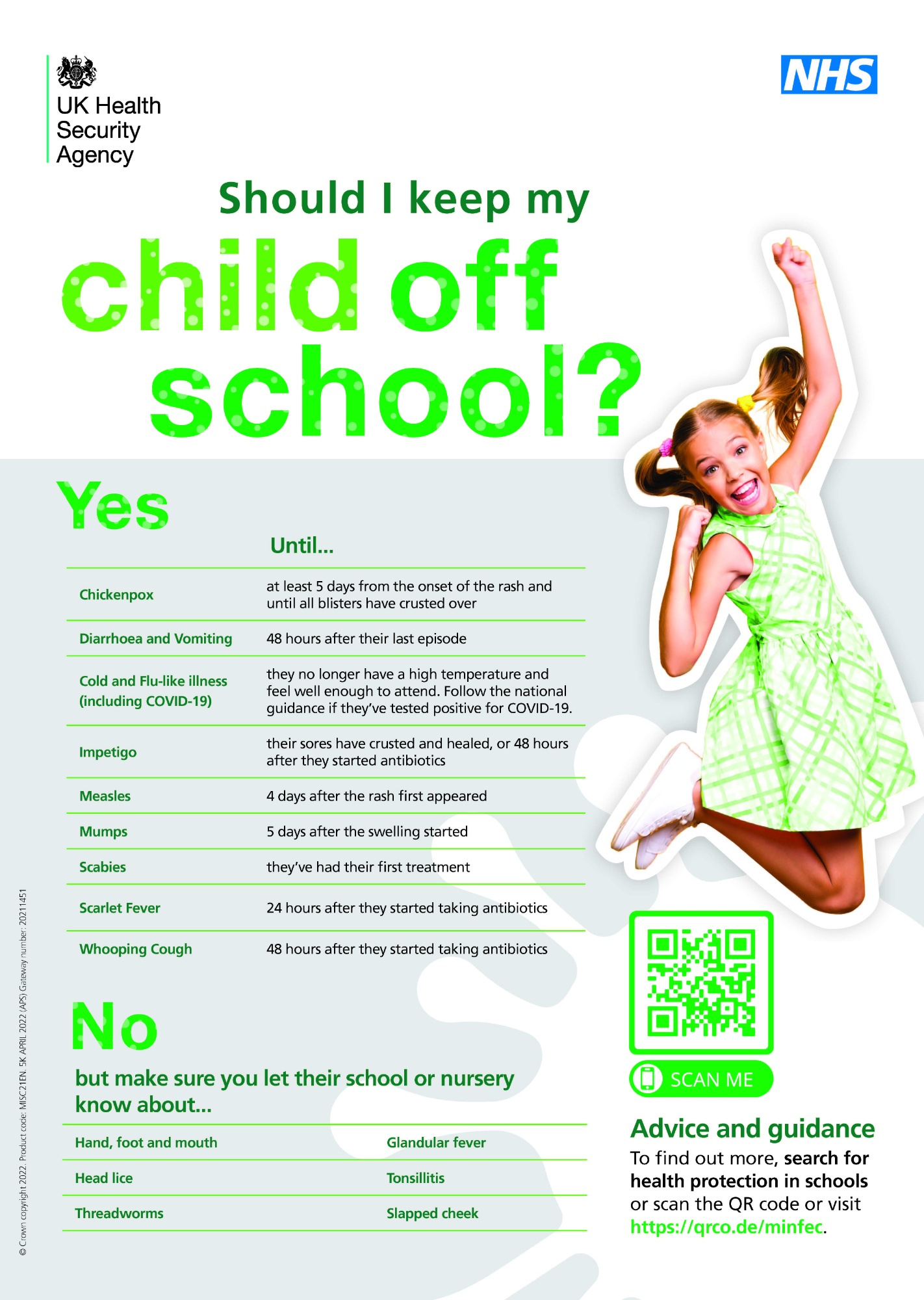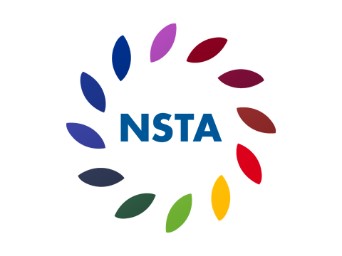Absence and Sickness
This page outlines key details and information regarding reporting your child absent from school, as well as UK Government Updates and guidelines on illnesses such as COVID-19.
Reporting absences to the school
If your child is unwell and unable to attend school please inform us as soon as possible (see contact details below).
Please do not to send your child or children back too soon after being unwell; If your child has been vomiting or had diarrhoea you are required to keep them off for 48 hours before returning to school.
It is important that parents/carers notify school on a daily basis if their child is not going to be in. You can do this by emailing absence@backwellschool.net or by calling the school on 01275 463371 and choosing option 1. Please include a brief outline of their symptoms/illness.
You can also inform us of appointments during the school day using the same contact details.
Important things to note
- Pupils should not be contacting home if they feel unwell during the school day; Your child needs to report to First Aid, where a member of staff can contact you, so they can be monitored until being picked up if this is necessary.
- If a child is too unwell to attend school they will not be set any remote learning whilst absent. Your child will need to speak to their teachers on their return to school to find out what important learning they have missed.
The following guidance is in place for those pupils who feel unwell with any sort of respiratory illness:
- Children and young people who are unwell and have a high temperature should stay at home and avoid contact with other people. They can go back to school when they no longer have a high temperature, and they are well enough to attend.
- For information: guidance for adults (those 18 and over) is as follows; adults with the symptoms of a respiratory infection, and who have a high temperature or feel unwell, should try to stay at home and avoid contact with other people until they feel well enough to resume normal activities and they no longer have a high temperature.

Requesting an exceptional absence
Exceptional absence requests
As outlined in the Lighthouse Schools Partnership (LSP) attendance policy the school cannot and will not authorise school absence unless due to exceptional circumstances.
Please note that the following reasons will not be considered as exceptional (as per Government guidelines):
- Visiting relatives
- Cheaper holidays in England and abroad
- Family day trips
- Visiting friends/family that have different holiday periods
- Employment restrictions during the summer holiday
- Because a child has good attendance
If you do wish to request an exceptional absence from school for consideration please complete the online form below.
Group A Strep and Chicken Pox
Group A Strep (GAS) Infection can cause a number of different illnesses:
- Scarlet Fever - scarlet fever is usually a mild illness, however, should be treated with antibiotics to minimise the risk of complications and reduce the spread to others. Scarlet fever includes non-specific symptoms such as sore throat, headache, fever, nausea and vomiting, followed by a fine red ‘sandpaper’ like rash which typically first appears on the chest and stomach, rapidly spreading to other parts of the body. On more darkly-pigmented skin, the scarlet rash may be harder to spot. The face can be flushed red but pale around the mouth. Scarlet fever - NHS (www.nhs.uk)
- Strep Throat - this is a more severe or longer-lasting infection in the throat and tonsils. Children are likely to be more unwell generally with difficulty swallowing due to the pain.
- Impetigo - this is a bacterial skin infection. It will start with red sores or blisters. These will burst quickly and leave crusty, golden-brown patches. Impetigo - NHS (www.nhs.uk)
Please remember that there are lots of viruses that cause sore throats, rashes, colds and coughs circulating at the moment. Many of these are mild and self-limiting and do not need any medical intervention
However, if you think you, or your child, may have a GAS infection:
• See your GP or contact NHS 111 as soon as possible
• Make sure that you/your child takes the full course of any antibiotics prescribed by the doctor.
• Stay at home, away from nursery, school, or work for at least 24 hours after starting the antibiotic treatment (48 hours for impetigo or until all lesions have crusted over/healed), to avoid spreading the infection.
• Reduce the spread by practising good hand and respiratory hygiene.
Chicken Pox
Chickenpox is usually a mild and common childhood illness that most children catch at some point. It causes a rash of red, itchy spots that turn into fluid-filled blisters that crust over to form scabs.
To prevent spreading the infection, children with chicken pox should stay away from the nursery, school or playgroups for at least 5 days from onset of the rash AND until all the spots have crusted over. Ibuprofen (Brufen, Nurofen, Calprofen) should NOT be given to children who have Chickenpox. Chickenpox - NHS (www.nhs.uk)
Some people are at higher risk from chicken pox and should contact a health professional who will assess if preventative treatment is needed:
If you/your child is immunosuppressed and you are certain that you/they have been in contact with chickenpox, please contact NHS 111 or your GP as soon as possible.
UK Health Security Agency South West
3rd Floor, 2 Rivergate
Temple Quay, Bristol, BS1 6EH
Follaton House, Plymouth Road, Totnes, Devon TQ9 5NE
T +44 (0)300 303 8162
swhpt@phe.gov.uk
www.gov.uk/government/organisations/uk-health-security-agency
• If you are pregnant, have not had chickenpox in the past, and are certain you have been in contact with chickenpox, please contact NHS 111, your GP or your midwife as soon as possible.
• If you are caring for a newborn baby and you are certain they have had contact with chickenpox please also contact your midwife, NHS 111 or your GP as soon as possible.
Complications
Children who have chickenpox or influenza at the same time as scarlet fever are more likely to develop more serious infection so parents should remain vigilant for symptoms such as a persistent high fever, cellulitis (skin infection) and arthritis (joint pain and swelling). If you are concerned for any reason, please seek medical assistance immediately.
COVID-19
- It is not recommended that children and young people are tested for COVID-19 unless directed to by a health professional.
- If a child or young person has a positive COVID-19 test result they should try to stay at home and avoid contact with other people for 3 days after the day they took the test, if they can. After 3 days, if they feel well and do not have a high temperature, the risk of passing the infection on to others is much lower. This is because children and young people tend to be infectious to other people for less time than adults.
- Children and young people who usually go to school, college or childcare and who live with someone who has a positive COVID-19 test result should continue to attend as normal.
- Please email absence@backwellschool.net if at any point the above applies to your child.
Other important things to note:
- School staff and students are no longer eligible for free COVID-19 lateral flow tests (unless in a specific vulnerable group), and the school will no longer be distributing test kits.
- Those who feel more comfortable wearing a mask in certain situations are welcome to continue to do so on the school site.
The School will continue to have regular contact with Public Health England (PHE) and if they have concerns about numbers of COVID-19 cases in the school, or local community, they could reintroduce measures and mitigations (including masks or asymptomatic testing).
The Government has now issued guidance on 'living safely with respiratory infections, including COVID-19'.
NHS guidance on symptoms of COVID-19 can be found here.




